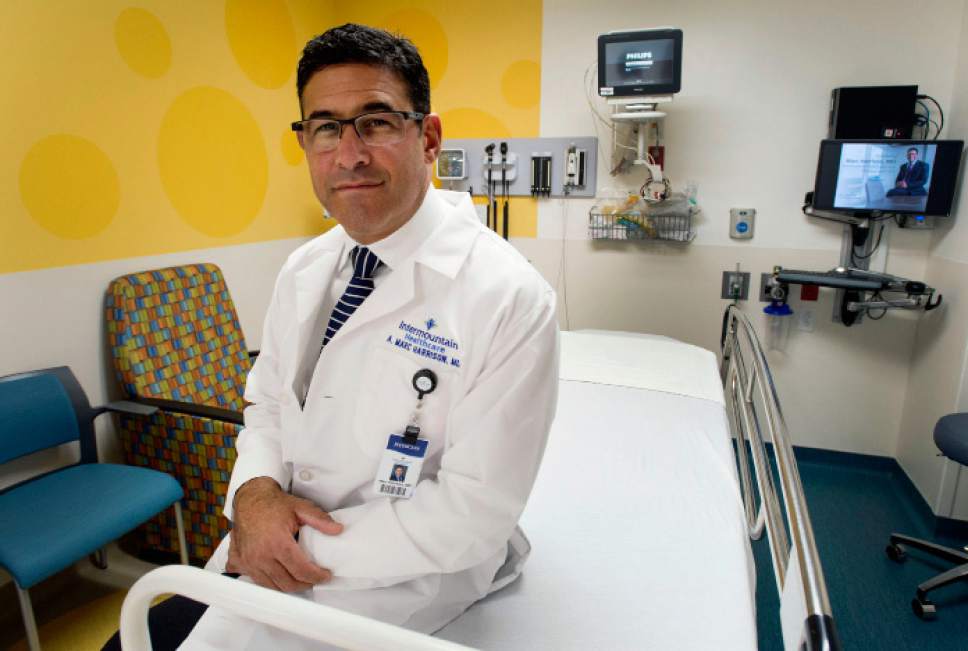This is an archived article that was published on sltrib.com in 2016, and information in the article may be outdated. It is provided only for personal research purposes and may not be reprinted.
No matter what life throws at A. Marc Harrison, he always manages to compete in a triathlon.
He raced while battling bladder cancer. He raced with babies at home. He raced regardless of where in the world he was living.
Harrison, 52, jokes it's his uptight and obsessive personality that's kept him competing every year since 1982. But more likely, it has something to do with his desire to constantly improve.
"I love the process of always striving, always trying to figure out how to get a little bit better," Harrison said. "It's never boring."
That mentality trickled into the rest of his life as the pediatric critical care doctor moved through the ranks at Ohio's Cleveland Clinic before landing the top job at Intermountain Healthcare.
Harrison's first day as the system's newest CEO was last month. He hasn't made any firm decisions about how to move the system forward, he said, but is impressed with the current strategy.
"I've never seen a place live out its mission values like Intermountain [by] providing extraordinary care that's affordable," he said. "I came here and saw people walking the walk and talking the talk. I found that very inspiring."
—
A kind of homecoming • Utah seemed like a grand, exotic adventure for Harrison and his wife, Mary Carole, when the two moved here in 1990.
They both were aspiring pediatricians from the East Coast — who met a year prior while delivering surprise twins when Harrison was a medical student at New Hampshire's Dartmouth College — and jumped at the opportunity to come to Primary Children's Hospital. He was an intern at the hospital, she was a resident.
"I'd like to say we were incredibly deep thinkers, but we weren't," Harrison said. "We were young and in love and ... it seemed like a great opportunity that was really exotic to us."
The couple ended up spending about six years in Salt Lake City.
They loved Utah professionally and personally, but eventually left and wound up at the Cleveland Clinic in Ohio.
Harrison first joined the clinic in 1999 as a pediatric intensive care doctor with an interest in cardiac care.
A self-proclaimed "accidental leader," Harrison worked to grow the clinic's program and "woke up one day as department chairman" over pediatric critical care.
He developed the hospital's critical-care transport program — that increased out-of-state visits — and is considered an authority on intensive care unit designs, according to MedCity News.
Brian Donley, chief of staff for the clinic, said Harrison had a "relentless passion" for improving patient and provider experiences.
Harrison worked his way up the leadership ranks at the clinic and was tapped in 2011 as CEO for its Abu Dhabi location.
There, he was tasked with replicating "all aspects of the clinic culture eight time zones away."
The hospital started with 35 people and an unfinished steel structure, he said. About four years later, he said, he was running an about 3-million-square-foot hospital with 3,500 employees from 70 different countries.
"Lots of people from all over the world came," he said. "They all sort of united in a desire to serve patients, and that was a thing I found incredibly inspiring."
Harrison thought he would finish his career at the clinic and was moving to London to head up the clinic's international business development.
But then he got a call that would bring his life full circle: Salt Lake City's Intermountain Healthcare wanted him to come back to run the system where his career in pediatrics started.
There wasn't much hesitation.
The Intermountain community drew him in, he said, but so did the city he and his wife loved so much.
"We loved [Salt Lake City] back then and we had zero money to go out for dinner," Harrison said. "Now we can go out for dinner."
—
New directions • Ann Millner said she was impressed by the amount of homework Harrison had done about Intermountain when he came before the board of trustees.
Harrison's credentials already stood out to Millner and other trustees when he was shortlisted for the CEO job: He had a depth of experience both domestically and internationally, she said.
Even better, she said, was when Harrison made it clear he understood the "vision and values" of the organization and that he was committed to improving them.
"He showed and demonstrated the knowledge of where we were and he had some ideas … about where we need to go," she said. "Without knowing the organization, he had already begun to think about [different] possibilities."
Harrison said he wasn't seeking out a new job when he learned he was being considered for the Intermountain position, but that he felt "lucky" someone recommended him.
He saw important strategies, such as excellent and affordable care, being lived out every day.
He plans to keep Intermountain on a similar track, he said, but is talking to as many people within the system as possible to determine where improvements can be made.
By the beginning of 2017, he plans to outline the direction he wants to take the system. He knows he wants to make precision genomics a priority, however.
"One of the things I'm enthused about, in addition to the system's excellence, is the community," he said. The commitment "to keeping care affordable is really extraordinary."
Twitter: @alexdstuckey



